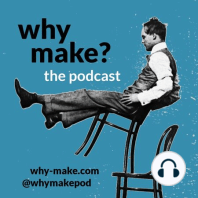31 min listen
Why Make? Episode 49: Wendy Maruyama Part II
ratings:
Length:
38 minutes
Released:
Feb 17, 2023
Format:
Podcast episode
Description
Why Make Podcast, Wendy Maruyama Episode Part II TranscriptTime Code00:00 Robb HelmkampHello and welcome to Why Make, where we talk to makers from different disciplines about what inspires them to make.With your hosts Robb Helmkamp and. Erik Wolken Erik Wolken. If you would like to learn more about the makers we interview on Why Make please go our website why-make.comRobb HelmkampAnd please help support the Why Make podcast and Why Make productions by making a tax refundable donation to us on Fractured Atlas.Erik WolkenFractured Atlas is our new non profit fiscal sponsor which allows us to access a wide range of funding possibilities including funding available only for non-profits Robb HelmkampVisit https://fundraising.fracturedatlas.org/the-why-make-project or go to the donate to Why Make page on Why-Make.com 01:03 Robb HelmkampWelcome to our first podcast of the 2023 season of Why Make. This episode is part two of our in depth conversation with the artist Wendy Maruyama.Erik Wolken Wendy Maruyama is a furniture maker, sculptor and retired educator who resides in San Diego California. Wendy’s work has tackled a wide scope topics from traditional furniture forms to exploring her Japanese heritage and the imprisonment of Japanese Americans during WW2 to the issue of endangered speciesRobb HelmkampAs we discuss later in the podcast Wendy was born with significant hearing loss and cerebral palsy and at her request, to aid our listeners, we have included a full transcript of our conversation on our web page for this episode which can be found on the podcast page of why-make.com It can also be found in the episode notes on Apple podcastsErik WolkenPlease join us and take a listen to our wide ranging discussion with one of the more amazing artists in the woodworking field, Wendy Maruyama.02:06 Erik Wolken Moving along Wendy, let's talk about the next phase of your work. Because the next phase of your work use do start to tackle some of your identities in your bodies of work in Turning Japanese, Simple Pleasures and Indulgences & Men in Kimonos you do start to sort of not only address your heritage, but really start to use narrative in your work. What was what was behind all of that? I mean, what do you think was the inspiration behind that? The whole thing that started with Turning Japanese and Men in Kimonos exploring your cultural identity.02:42 Wendy MaruyamaI think the Turning Japanese series the Men in Kimono riff came from my first trip to Japan could be in '92 maybe I can't remember but I'd never been to Japan until the early 90's and like anybody else I was just amazed by what I was seeing over there especially the craft scene. There is such a strong craft heritage in Japan not only with woodworking, ceramics of different styles at the same time some of the fields like textiles really evolved into the modern times to use the unusual fibers and metal in weaving. And then of course, going to downtown Tokyo in the Shibuya District dominated with all this neon stuff, it was very much like Blade Runner if you've seen the movie Blade Runner? It was clearly based on Tokyo. And so there are these two very different aspects of Japan, the old and the very, very, very new high tech side of it. There is a little bit of conflict to you know, I'd be riding on the subway and you can see these Japanese business men reading these pornographic cartoons it was called Manga. I think it was it all these lady with big boobs, it's all cartoons. It was such a flurry of images and so I think some of that was mostly my personal response to what I saw in Japan and I realized that I didn't fit even though I was Japanese American. Japanese descent. I did not fit into that whole culture, I mean, even if I tried. I mean, I'm kind of proud of it from a distance but I realized I don't think like that. So, maybe that was kind of a mixture of sadness and relief in a way. It is a very patriarchal society so there was that and it was kinda just a response
Released:
Feb 17, 2023
Format:
Podcast episode
Titles in the series (59)
Why Make Episode 1 : The beginning: A conversation with the founders of the Why Make project, Erik Wolken and Robb Helmkamp by Why Make? Podcast
